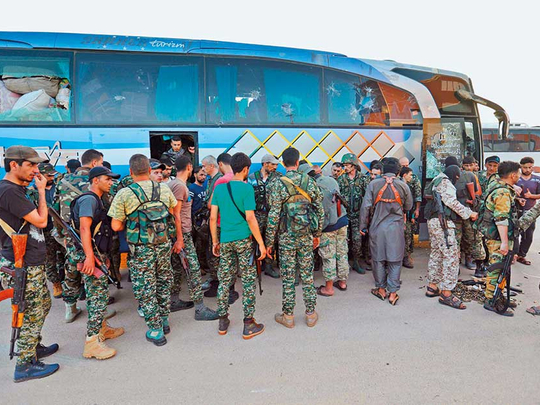
Beirut: The Syrian state news agency SANA said on Thursday there are reports that rebels had agreed a surrender deal in the southwestern province of Quneitra at the frontier with the Israeli-occupied Golan Heights.
Reuters could not independently confirm the report.
If verified, the move would mark another major victory for President Bashar Al Assad, who has recovered swathes of southwestern Syria over the last month in a Russian-backed offensive that has forced many rebels to surrender.
SANA, citing its correspondent, said the deal stipulated a return of the Syrian army to positions it held prior to 2011, when the Syrian conflict erupted.
Citing reports, SANA said the agreement “stipulates the departure to Idlib of terrorists who reject the settlement” and allowed those who wish to remain to “settle” their status with the authorities, meaning accepting a return of Al Assad’s rule.
A rebel source sent a copy of what he said was the final agreement -- that included a provision that Russian military police would accompany two Syrian army brigades into a demilitarised zone that has been in place on the Occupied Golan Heights since 1974.
The zone was agreed after the 1973 War.
There would be further negotiations on a deadline for handing over medium and heavy weapons, according to the agreement sent by the rebel source.
US President Donald Trump said at a news conference with Russian President Vladimir Putin on Monday in Helsinki that both had agreed to work together to help ensure Israel’s security.
Putin, Al Assad’s most powerful ally, cited the need to restore the situation along the Occupied Golan borders to the state that prevailed before the outbreak of the Syrian crisis in 2011.
Meanwhile, evacuations were underway on Thursday, state television reported, of two pro-government villages in northwestern Syria.
The evacuation is part of an agreement between the Damascus government and rebels who had laid siege to them for several years.
In exchange, the government was due to release hundreds of prisoners from its jails.
Pro-Damascus TV stations said at least 20 buses carrying “militants” released from jail had crossed into rebel-held territory under the agreement.
Close to 7,000 people - civilians and fighters - were due to leave the loyalist Shiite villages of Al Foua and Kefraya in Idlib province.
They were being ferried out in a convoy of buses through rebel-held territory to nearby government-held territory in Aleppo province, state TV footage showed.
Footage broadcast by Al Manar TV, which is run by the pro-Damascus Shiite group Hezbollah, showed the buses arriving at a government checkpoint in Al Eis, east of the two villages.
Many had smashed windscreens—Al Manar’s reporter said they had been pelted with rocks as they drove through rebel areas.
A separate convoy of buses was then shown crossing from Al Eis into the rebel-held territory.
Al Manar’s reporter at the scene said they were carrying detainees released under the deal.
Population transfers have been a common feature of the seven-year war, but have mostly come at the expense of Al Assad’s opponents.
Rebels and civilians have been bussed out of their hometowns to rebel territory in the north as government troops advanced, backed by Russian and Iranian forces.
The opposition has decried it as a systematic policy of forcible displacement, or “demographic change”, aimed at getting rid of Al Assad’s opponents.
Al Assad has vowed to recover the entire country, and Idlib province is the last major rebel-held part of Syria.












